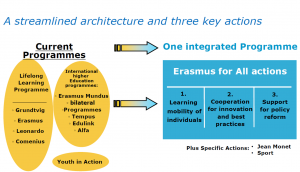 The short answer is ‘Yes’! BU holds a number of these awards and I am delighted they will be staying in Horizon 2020 with a huge budget of €19bn. To make things simpler, the EC has streamlined several programmes into one ‘Erasmus for All’ which contains three action strands.
The short answer is ‘Yes’! BU holds a number of these awards and I am delighted they will be staying in Horizon 2020 with a huge budget of €19bn. To make things simpler, the EC has streamlined several programmes into one ‘Erasmus for All’ which contains three action strands.
1. Learning mobility of individuals: This is focused on Staff mobility (in particular teachers and trainers); mobility for higher education students; a Master degree scheme and volunteering and youth exchanges. This is where Erasmus Mundus and Erasmus Staff Mobility as you know it will sit.
 2. Cooperation for innovation and best practices: This focuses on strategic partnerships between youth organisations and other relevant actors; Large-scale partnerships between education and training establishments and business; IT-Platforms; and cooperation with third countries. Also included in here are the existing Sector Skills Alliances and Knowledge Alliances (the latter is a structured partnership between a university and enterprise to promote an active 2 way knowledge exchange with a focus in partnership, innovation and long term impact; an example is here).
2. Cooperation for innovation and best practices: This focuses on strategic partnerships between youth organisations and other relevant actors; Large-scale partnerships between education and training establishments and business; IT-Platforms; and cooperation with third countries. Also included in here are the existing Sector Skills Alliances and Knowledge Alliances (the latter is a structured partnership between a university and enterprise to promote an active 2 way knowledge exchange with a focus in partnership, innovation and long term impact; an example is here).
3. Support for policy reform: This includes an open method of Coordination; valorisation and implementation of EU tools; and policy dialogue with stakeholders, third countries and international organisations.
More details on Erasmus for All will be posted as I get them and you may wish to read this leaflet produced by the EC in the meantime.















 SPROUT: From Sustainable Research to Sustainable Research Lives
SPROUT: From Sustainable Research to Sustainable Research Lives BRIAN upgrade and new look
BRIAN upgrade and new look Seeing the fruits of your labour in Bangladesh
Seeing the fruits of your labour in Bangladesh Exploring Embodied Research: Body Map Storytelling Workshop & Research Seminar
Exploring Embodied Research: Body Map Storytelling Workshop & Research Seminar Marking a Milestone: The Swash Channel Wreck Book Launch
Marking a Milestone: The Swash Channel Wreck Book Launch ECR Funding Open Call: Research Culture & Community Grant – Application Deadline Friday 12 December
ECR Funding Open Call: Research Culture & Community Grant – Application Deadline Friday 12 December MSCA Postdoctoral Fellowships 2025 Call
MSCA Postdoctoral Fellowships 2025 Call ERC Advanced Grant 2025 Webinar
ERC Advanced Grant 2025 Webinar Update on UKRO services
Update on UKRO services European research project exploring use of ‘virtual twins’ to better manage metabolic associated fatty liver disease
European research project exploring use of ‘virtual twins’ to better manage metabolic associated fatty liver disease